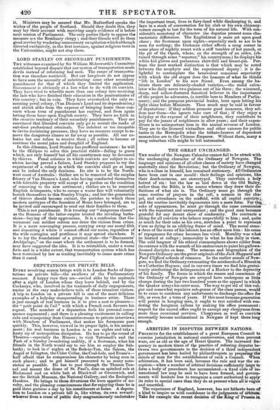LORD STANLEY ON SECONDARY PUNISHMENTS. THE witnesses examined by Sir
William Molesworth's Committee established beyond dispute that our system of transportation made devils instead of reforming bad men. The range of transporta- tion was therefore restricted. But our lawgivers do not appear to have seen the necessity of substituting some other secondary punishment for that of which they limited the application. Government is obviously at a loss what to do with its convicts. They have tried to wheedle more than one colony into receiving the lads who have finished their education in the penitentiaries of this country ; but in vain. They have overstocked the only re- maining penal colony, (Van Diemen's Land and its dependencies,) and shrink alike from the expense of bringing. home those con- yids whose term of punishment has expireoi, and from again letting them loose upon English society. They have no faith in the curative tendency of their secondary punishments. They are convinced that liberated convicts only kr,o to recruit the ranks of out-door professional criminals. Too indolent or too incapable to deVise reclaiming processes, they have no resource except to re- move the dangerous classes as far away as possible. All our co- lonies but one refuse to receive them ; all refuse to become or continue the moral jokes and dunghill of England. In this dilemma, Lord Stanley has proffered assistance : he will be the (Edipus to solve this practical riddle—failing to guess which, not only himself but all his countrymen may be devoured by thieves. Penal colonies in which convicts are subject to co- ereion having proved a failure Lord Stanley proposes to try the experiment of a colony in which the convicts shall go at large and be indeed the only denizens. Its site is to be the North- west coast of Australia : thither are to be removed all the surplus felonry of Van Diemen's Land, who having conducted themselves with tolerable propriety will accept of a pardon on the condition of removing to the new settlement ; thither are to be removed English delinquents; who to escape a worse fate will voluntarily banish themselves to this Stanley Utopia ; and lest the generation of thieves should become extinct, the parishes to which these modern antitypes of the founders of Rome have belonged, are to be invited and encouraged to send out their families to them. This is not punishment. It is treating our " dangerous classes" as the Romans of the latter empire treated the invading barba- rians—buying off their aggressions. It is a confession that Go- vernment can neither reform nor deter the vicious from crime. It is a mere scavenging process, carrying away our moral filth and depositing it where it cannot offend our noses, regardless of the wide contagion and pestilence it may spread elsewhere. It is to lay the foundations of a piratical state—the "Buccaneers' Archipelago," on the coast where the settlement is to be formed, may have suggested the idea. It is to reestablish, under a worse form and in a wider extent, that transportation system which has been restrained by law as tending inevitably to cause more crime thin it cured.


























 Previous page
Previous page